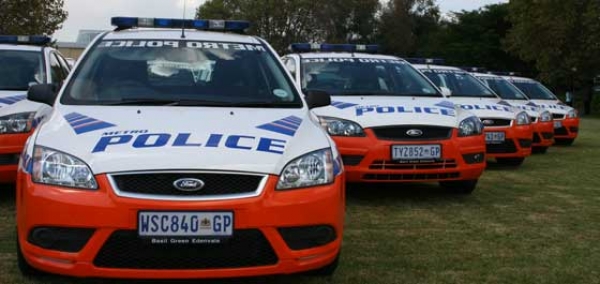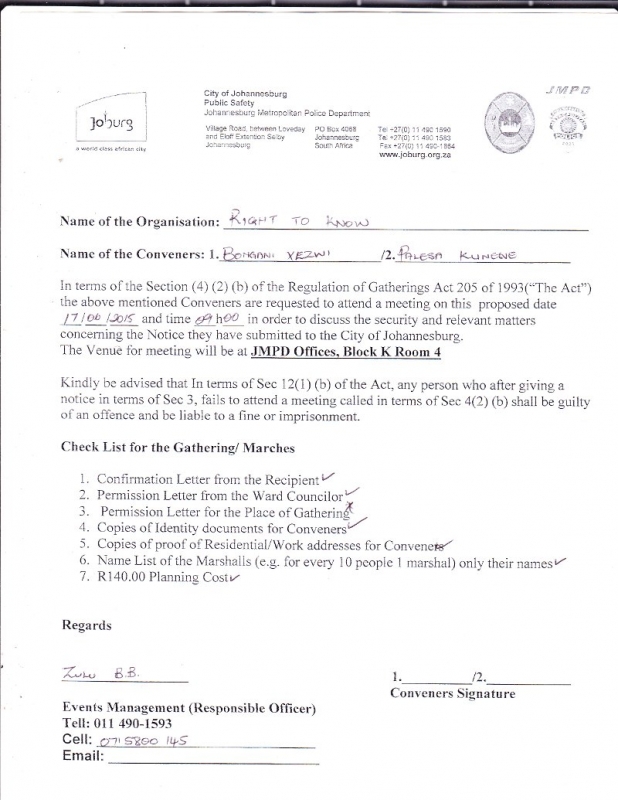When protesters have to teach police what the law says

On Friday, R2K Gauteng is planning a protest at the gates of the Johannesburg Metro Police Department (JMPD). We did this after many years of frustration — from R2K activists and other civic structures in Gauteng — at how JMPD officers have undermined the right to protest.
Why? Because the metro police have invented their own rules for who gets to protest, when and how. JMPD officials demand that anybody who wants to hold a protest in Joburg must pay a fee and fulfil an illegal “checklist” of requirements. JMPD officials will sometimes go to great lengths to find bureaucratic reasons to block protest actions.
In fact, as this article was written (Thursday 18 June), JMPD was still coming up for reasons why we could not hold the protest tomorrow. One reason they gave is that this is not a matter for a protest; if we have a problem with their “checklist” we should go to court.
Every person has the right to protest. It is a form of freedom of expression that is protected in the South African constitution but JMPD and their checklist are violating that right.
Since the 1990s the right to protest has fallen under the Regulation of Gatherings Act, a law which spells out the relationship between protesters, police and government officials. The Gatherings Act says that you should give notice to the municipality that you will hold a protest. It asks for seven days’ notice ideally, but you can also give as little as two days’ notice if you also give reasons for the short notice.
You must also give certain information such as contact details of the organisers, where the protest will take place, what time, and so on. If you have done that, the protest must be allowed to go ahead, unless there is good reason to believe that it would lead to injury, property destruction or traffic disruption. And even then police cannot just ‘ban’ the protest, they must call you to a meeting to address these concerns and negotiate a solution – such as a different route.
We think there are many limits to this law and we have seen how it can infringe on the right to protest, including peaceful ones. There are many examples but the high-profile ones include prosecution of activists of Social Justice Coalition in Cape Town and Community Health Workers in Free State.
But across South Africa many of the restrictions that people experience on their right to protest are illegal under the Regulation of Gatherings Act. For example many officials don’t talk about “giving notice”: they think we are “applying for permission” to hold a protest. And therefore they think it’s their right to say ‘yes’ or ‘no’ for their own invented reasons.
According to the JMPD ‘checklist’, anyone who wants to exercise their right to protest must first give the following things:
- A letter from the person we are protesting against
- A permission letter from the ward councillor
- Copies of our leaders’ ID documents
- Proof of our leaders’ addresses
- The names of every single marshal in the organising team – for a 1000-person march this could be a list of a hundred people!
Worst of all, they demand payment of R140 for a “planning cost”. Those who can’t pay, can’t protest.
You won’t find any of these things in the Gatherings Act. It is a JMPD invention.
And to make it worse, the JMPD arrogantly believes that it will only accept and deal with these matters on a Wednesday – when they will call us to a meeting to discuss our protest. And in many cases they will suddenly say in this meeting that our protest cannot go forward – sometimes at the last minute, after we have done weeks of planning and mobilisation. If we defy them and claim our right to protest, we will be arrested and charged with an illegal gathering.
I have asked for them to give us a reason in writing for denying our right to march tomorrow, but by this afternoon (18 June) I had not yet got anything. Our concern is that if we are only ‘denied’ at the last minute, it will give us no time to get legal advice or to plan our response.
On Friday we want to go ahead with our protest as is our legal right. We need to send JMPD the message that we will no longer play these games. We are tired of them making up their own rules and using a self-invented bureaucratic procedure to clamp down and prevent people from enjoying our constitutional right to protest.
We demand a scrapping of this checklist system. No more R140 “planning” fee. We demand that JMPD starts following the Regulation of Gatherings Act. Even though the Act is not perfect it at least gives some protection to protesters and doesn’t allow police or municipal officials to make arbitrary decisions on when and how we can protest.
Remember that holding a protest is just one step in a very long journey to making communities’ voices heard and ensuring people’s demands are met – whether that is a campaign for justice for Marikana miners or ensuring there is clean water or electricity in a particular area. But instead we are often fighting just for the right to make our voices heard.
We know that activists in Joburg Metro are not the only ones facing these restrictions. In many municipalities across SA we see officials in small offices inventing unconstitutional “laws” and “rules” to undermine our right to protest and exercise our voice in this democracy. We call on all across the country who experience these kinds of abuses to join us in saying NO. We demand the right to protest!

Bongani Xezwi is the R2K Gauteng organiser. Download R2K’s guide to the Regulation of Gatherings Act and the right to protest at http://r2k.org.za/protestguide. Views expressed are not necessarily GroundUp’s.
Next: Wynberg residents resist MyCiti bus plans
Previous: Tattoos - township style

This article is licensed under a Creative Commons Attribution-NoDerivatives 4.0 International License.


